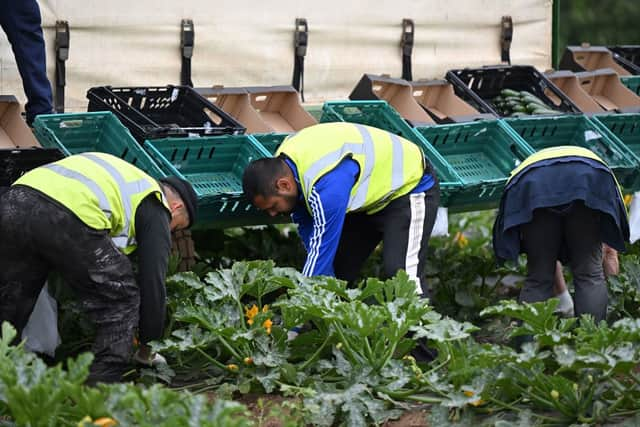National Food Strategy: Henry Dimbleby’s 2022 UK government white paper proposals - did DEFRA ‘ignore’ them?
and live on Freeview channel 276
Boris Johnson has promised that his new food strategy for England will "back farmers," following opponents' dismissal of a leaked draft of the document as "half-baked."
Ministers want to strengthen the nation's supply chains and increase domestic production so “we will grow and eat more of our own food”, which will help protect the country from future economic shocks and disasters.
Advertisement
Hide AdAdvertisement
Hide AdThe strategy was published on Monday (13 June) in response to a significant study of the country’s food system by Leon restaurant co-founder Henry Dimbleby.
It lays out how the government would support farmers, develop British industry, and ensure food security, according to the Prime Minister.
Here is everything you need to know about it.
What is in the new food strategy?
Ministers have said reducing the distance between farm and fork is a top focus, with a goal of spending 50% of public sector food funds on food produced locally or certified to higher standards.
The strategy also lays out intentions to establish a new professional organisation for the farming and growing industry, as well as to increase training and build clear career routes, ensuring that people and businesses have the skills they need to run sustainable and lucrative operations.
Advertisement
Hide AdAdvertisement
Hide AdThe official strategy verifies some components of the leaked draft, such as the aim to initiate an independent review to address labour shortages in the food supply chain, and to advise on ways to improve and expand animal welfare labelling.
The Government will also look at how to make the most of feed additives that can help animals emit less methane, publish a land use framework in England next year, and consult on food waste reporting for enterprises over a certain size.


Why is it controversial?
Ministers have been accused of concocting a plan that is “bordering on the preposterous,” ostensibly ignoring major recommendations from Dimbleby’s analysis.
The Guardian newspaper revealed a leaked draft of the strategy on Friday 10 June, which appeared to show that requests for a sugar and salt reformulation tax, as well as a suggestion that the budget for farmer payments be guaranteed until 2029, had been ignored.
Advertisement
Hide AdAdvertisement
Hide AdBoris Johnson has rejected claims that the new food strategy fails to combat obesity, and said that the most effective method to lose weight is to "eat less."
Speaking at Southern England Farms in Hayle, south west Cornwall, he said: “What we don’t want to do right now is start whacking new [sugar and salt] taxes on [the food and drink industry] that will just push up the cost of food.
“Of course you’ve got to champion healthy eating, you’ve got to help people to lose weight, there are all sorts of ways of doing that. The best way to lose weight, believe me, is to eat less.”
Campaigners also slammed parts of the proposal that they believe are “goading” farmers to produce more meat; Johnson has refuted that the new strategy abandons ecological goals in favour of production.
Advertisement
Hide AdAdvertisement
Hide AdOfficially launching the strategy on Monday (13 June), the Government said it had adopted “the majority of recommendations” from the report, including policy actions to improve health, diet sustainability and accessibility, and food supply security.
The Food Foundation labelled the paper “disappointing,” saying it “misses this mark” since many of its commitments will “flounder” unless new legislation is enacted to keep them in place.
The charity’s executive director, Anna Taylor, said: “Despite its name, the whole document is lacking a strategy to transition the food system towards delivering good food which is accessible to everyone.
“And without a commitment to a new Food Bill, many of the commendable commitments made are in reality toothless.
Advertisement
Hide AdAdvertisement
Hide Ad“It is a feeble interpretation of Henry Dimbleby’s recommendations, which will not be sufficient to drive the long-term change that we know is so urgently needed.”
What has been ‘ignored’?
In 2019, Michael Gove announced that Dimbleby would oversee a review of England's food system to ensure that it is "safe, healthy, and affordable" for all.
The assessment also looked into how the food system may aid in the restoration and enhancement of the natural environment, the development of a resilient and sustainable agriculture sector, and the contribution of urban and rural economies.
Dimbleby recommended a sugar and salt reformulation tax as a significant component of attempts to change the nation's diet in his final report, which was published in 2021 - Ministers seems to have overlooked this in the strategy.
Advertisement
Hide AdAdvertisement
Hide AdDimbleby also urged authorities to ensure that the funding for payments to farmers for environmental advantages — such as restoring nature, reducing floods and enhancing soils – was guaranteed until at least 2029, according to his report.
However, this seems to be overlooked in the draft White Paper, with the Government instead reiterating its commitment to sustain spending levels for the current legislative session.
Comment Guidelines
National World encourages reader discussion on our stories. User feedback, insights and back-and-forth exchanges add a rich layer of context to reporting. Please review our Community Guidelines before commenting.
